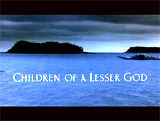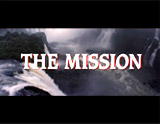|
1986
The winner is listed first, in CAPITAL letters.
|
Best Picture
|

|

|

|

|

|
|
PLATOON (1986)
|
Children of a Lesser God (1986)
|
Hannah and Her Sisters (1986)
|
The Mission (1986, UK)
|
A Room With a View (1985, UK)
|
Actor:
PAUL NEWMAN in "The Color of Money", Dexter Gordon
in "'Round Midnight", Bob Hoskins in "Mona Lisa",
William Hurt in "Children of a Lesser God", James Woods
in "Salvador"
Actress:
MARLEE MATLIN in "Children of a Lesser God", Jane Fonda
in "The Morning After", Sissy Spacek in "Crimes
of the Heart", Kathleen Turner in "Peggy Sue Got Married",
Sigourney Weaver in "Aliens"
Supporting Actor:
MICHAEL CAINE in "Hannah and Her Sisters", Tom Berenger
in "Platoon", Willem Dafoe in "Platoon",
Denholm Elliott in "A Room with a View", Dennis Hopper
in
"Hoosiers"
Supporting Actress:
DIANNE WIEST in "Hannah and Her Sisters", Tess Harper
in "Crimes of the Heart", Piper Laurie in "Children
of a Lesser God", Mary Elizabeth Mastrantonio in "The
Color of Money", Maggie Smith in "A Room with a View"
Director:
OLIVER STONE for "Platoon", Woody Allen for "Hannah
and Her Sisters", James Ivory for "A Room with a View",
Roland Joffe for "The Mission", David Lynch for "Blue
Velvet"
 All
five of the Best Picture nominees were made outside of the
established Hollywood system - and all five of the nominees
shared in the top prizes (12) this year. All
five of the Best Picture nominees were made outside of the
established Hollywood system - and all five of the nominees
shared in the top prizes (12) this year.
The Best Picture winner in 1986 was controversial
writer/director Oliver Stone's brutally-candid anti-war epic Platoon (with
eight nominations and four wins - Best Picture, Best
Director, Best Sound, and Best Film Editing), an authentic
re-creation of the infantry foot-soldier Vietnam experience,
and one of the best but grittiest films made on the subject.
The film was backed by the independent Hemdale Film Corporation.
[It was Stone's second career Oscar - he won earlier
for his screenplay for Midnight Express (1978).]
The harrowing film, from a grunt's point-of-view,
was based on director Stone's own tour of duty in Vietnam,
and focused on the conflict and struggle between two major
father figures: an 'evil' Sergeant (Berenger) and a 'good'
Sergeant (Dafoe), over the soul of an innocent, young recruit
(Sheen).
The other four Best Picture nominees provided
strong competition:
- director James Ivory's Merchant-Ivory production
of the British film A Room with a View (with eight
nominations and three wins - Best Screenplay, Best
Art/Set Direction, and Best Costume Design), a romance set
in 1908 Edwardian England that explores the consequences
of a trip to Florence, Italy by a curious upper middle-class
young British woman and her aunt - a spinster chaperone
- writer/director Woody Allen's complex film
of a two-year examination of a multi-charactered family told
through three interlaced stories of three sisters in Hannah
and Her Sisters (with seven nominations and three wins,
including Best Supporting Actor, Best Supporting Actress,
and Best Original Screenplay) - it was the highest-grossing Allen
film to date
- female director Randa Raines' Children
of a Lesser God (with five nominations and one win
- Best Actress) - the poignant film adaptation of Mark
Medoff's Tony Award-winning play about a growing romance
between a speech teacher (for the hearing impaired) and
a young deaf woman - it was the first film directed
by a woman to receive a Best Picture nomination
- director Roland Joffe's British epic of the
building of a 1750s South American mission in the action-thriller The
Mission (with seven nominations and only one win
- Best Cinematography)
Oliver Stone won the Best Director Oscar - it
was his first Best Director Oscar. [He later won a second Best
Director Oscar for his Born on the Fourth of July (1989).]
Stone also had two Oscar nominations in the same category,
Best Original Screenplay, for two different films: Platoon and Salvador.
Both lost to Woody Allen's Hannah and Her Sisters.
As stated earlier, Children of a Lesser God was
the first female-directed film ever to be nominated
for Best Picture. However, the female director Randa Haines,
with her feature film debut, was the only director of a Best
Picture-nominated film who was not nominated for Best
Director. [The fact that she was overlooked - and that only one woman
up to that time had received a Best Director nomination - Lina
Wertmuller for Seven Beauties (1976) - was interpreted
as sexist.] Her place was taken by two-time director nominee
David Lynch for Blue Velvet,
the disturbing mystery about the seamy underside of small-town
American life.
The Best Actor award was won by Paul Newman (with
his seventh nomination and first win) in a reprise/remake
of an earlier role from The Hustler
(1961) as an older pool hustler 'Fast Eddie' Felson
- now manager of his pool-heir apparent (Tom Cruise) in director
Martin Scorsese's sequel The Color of Money (with four
nominations and one win). The award was a dubious honor - it
really represented praise for his entire career's work of great
performances, mostly for his colorful non-conformist roles
in numerous films.
[Paul Newman became the only actor,
to date, to win an Oscar for reprising a role in a
sequel. He remained home, claiming: "I've been there
six times and lost. Maybe if I stay away, I'll win" -
and he did! With his Oscar, Newman and wife Joanne Woodward
became the second married couple to win acting Oscars
- following in the footsteps of Laurence Olivier (who won
in 1948) and Vivien Leigh (who won in 1951). Note: Peter
O'Toole was nominated twice for playing the same character,
Henry II, in Becket (1964) and The Lion in Winter
(1968), but lost both times. And in a different order,
Bing Crosby was nominated twice for playing the same character,
Father Chuck O'Malley, in Going My Way (1944) (Best
Actor win), and in The Bells of St. Mary's (1945) (Best
Actor nomination).]
The other Best Actor nominees were:
- non-actor and real-life jazz saxophonist Dexter
Gordon (with his first nomination) as alcoholic Dale Turner
in 1950s Paris - a self-destructive, black, tenor saxophonist
and be-bop jazz musician in French director Bertrand Tavernier's 'Round
Midnight (with two nominations and one win - Best Original
Score for Herbie Hancock)
- Bob Hoskins (with his first nomination - although
he had won the Best Actor Golden Globe award for this performance)
as naive but earnest London ex-mobster George who becomes
a chauffeur for a pretty black prostitute into the underworld
in Irish director Neil Jordan's offbeat crime-thriller Mona
Lisa (the film's sole nomination)
- William Hurt (with his second nomination after
winning in the previous year for Kiss of the Spider Woman
(1985)) as James Leeds, an instructor at a school for
the hearing impaired in Children of a Lesser God
- James Woods (with his first nomination) as
American photojournalist/reporter Richard Boyle caught in
El Salvador's 1980-81 civil war (the film was shot in Mexico),
in director Oliver Stone's second film of the same year -
the semi-autobiographical Salvador (with two nominations
and no wins); the film was virtually unknown when originally
released until it aired on LA's cable station Z Channel and
became more widely acknowledged
With Marlee Matlin's dark-horse Best Actress
Oscar win for Children of a Lesser God as deaf, feisty
and surly Sarah Norman, an intelligent and independent-minded
graduate of a hearing-impaired school who refuses to be anything
but the school's janitor (and lover of co-star William Hurt),
21 year old hearing-impaired performer Matlin became the youngest winner
of a Best Actress Oscar - and the film's sole Oscar
winner in her feature film debut. She was the first deaf
actress to be nominated for an Academy Award. [In her stereotype-breaking
role in which she spoke in American Sign Language, Matlin,
in her debut film, was the first actual 'handicapped'
person to win an Oscar since Harold Russell won as a double
amputee for  The
Best Years of Our Lives (1946). In the film, the meaning
of her sign language was 'said' aloud by her co-star William
Hurt when they conversed together. During the awards ceremony,
she spoke her acceptance speech.] The
Best Years of Our Lives (1946). In the film, the meaning
of her sign language was 'said' aloud by her co-star William
Hurt when they conversed together. During the awards ceremony,
she spoke her acceptance speech.]
The other nominees in the Best Actress category
included:
- Jane Fonda (with her seventh nomination -
and the film's sole nomination) as the alcoholic heroine-victim
Alex Sternbergen who wakes up next to a dead man in director
Sidney Lumet's thriller The Morning After
- Sissy Spacek (with her fifth nomination) as
Babe Magrath, one of three eccentric sisters in Mississippi
brought together in director Bruce Beresford's adaptation
of Beth Henley's Pulitzer Prize-winning play Crimes of
the Heart (with three nominations and no wins)
- the favored nominee - Kathleen Turner (with
her first nomination) as time-warped, 42-year old Peggy Sue
who travels back to the high-school prom age of 17, in director
Francis Ford Coppola's fantasy/comedy Peggy Sue Got Married (with
three nominations and no wins; also nominated for Best Cinematography
and Best Costume Design)
- Sigourney Weaver as heroine Ripley in director
James Cameron's exciting, action science-fiction film sequel Aliens (with
seven nominations and two wins - Best Visual Effects and
Best Sound Effects Editing)
[Weaver's nomination was memorable - it was the first nomination
ever for a female in an all-action role!]
Both the Best Supporting Actor and Actress awards
were won by performers in Woody Allen's Hannah and Her Sisters:
- Michael Caine (with his fourth nomination
and first win) as rock-star business manager Elliot, adulterous
husband of 'perfect' sister Hannah (Mia Farrow) but obsessed
with Hannah's sister (Barbara Hershey)
TRIVIA: Caine was unable to attend the Oscars ceremony (except
by closed circuit TV), because he was in Nassau and contractually
obligated while filming the very inferior 4th installment of
the long-running film: Jaws: The Revenge (1987)
- Dianne Wiest (with her first nomination and
win) won the Best Supporting Actress Oscar as nerve-wracked,
neurotic would-be actress Holly (also a caterer and former
coke addict) - one of Hannah's two sisters who eventually
married a hypochondriac (Woody Allen)
Co-stars from Platoon were first-time
nominees in the Best Supporting Actor category, in roles as
experienced sergeants who represent the forces of good and
evil warring against each other:
- Tom Berenger as remorseless war veteran Sgt.
Barnes
- Willem Dafoe as Sgt. Elias - a more humane
and compassionate soldier
The remaining two Best Supporting Actor nominees
were:
- Denholm Elliott (with his first nomination)
as the eccentric Mr. Emerson in A Room with a View
- Dennis Hopper (with his second nomination)
as Shooter, the alcoholic father of one of the basketball
team's players (of a 1950s Indiana high school) in director
David Anspaugh's Hoosiers
The other Best Supporting Actress nominees were:
- Tess Harper (with her first nomination) as
irritable next-door neighbor Chick Boyle in Crimes of
the Heart
- Piper Laurie (with her third unsuccessful
nomination) as Marlee Matlin's mother Mrs. Norman in Children
of a Lesser God
- Mary Elizabeth Mastrantonio (with her first
nomination) as Tom Cruise's girlfriend Carmen in The Color
of Money
- Maggie Smith (with her fifth nomination) as
Charlotte Bartlett, Helena Bonham Carter's chaperone in A
Room with a View
The Best Documentary Feature winner was Down
and Out in America about America's homelessness problem
in the mid-80s due to a recession, narrated and directed
by four-time Best Supporting Actress nominee Lee Grant (who
won once for Shampoo (1975)). [However, the Oscar
award was given to producers Joseph Feury and Milton Justice.]
Chuck Workman's Precious Images won the
Oscar for Best Live-Action Short Film, which was a focused
montage of classic film moments from the early 1900s to the
mid-80s - found in over 450 clip segments. This film would
make him a perennial Academy Awards favorite as a contributor
of movie montages.
Oscar Snubs and Omissions:
Eccentric David Lynch's director-nominated film Blue
Velvet was only nominated once for Best Director
- and Lynch lost. Although Dennis Hopper was nominated
in the same year for his supporting role as Shooter - the
father of a small-town basketball player in Hoosiers,
his scary, moving performance as abusive and sadistic psycho
Frank Booth in Lynch's film should have been nominated
instead. Isabella Rosselini was also un-nominated for her
fearless role as the victimized soulful lounge singer Dorothy
Valens, masochistically-linked to the obscenity-spewing,
velvet-fixated, nitrous-oxide inhaling Frank.
Oliver Stone's film about American involvement
in Central America titled Salvador wasn't nominated
in two major categories - Best Director and Best Picture. Rob
Reiner's coming-of-age drama Stand By Me, based upon
Stephen King's short story about four young males who adventurously
sought a dead body in the woods over a two-day period, received
only one nomination - for Best Adapted Screenplay - this obviously
neglected the acting performance of River Phoenix as Chris
Chambers.
Director Michael Mann's Manhunter went
completely unnominated, for Best Director, Best Cinematography
(Dante Spinotti), Best Actor (William L. Petersen as Will Graham),
and three Best Supporting Actor nominations: Tom Noonan for
his frightening role as Frances Dolarhyde (The Tooth Fairy),
Brian Cox's brief role as a convincing Dr. Hannibal Lektor,
and Stephen Lang as tabloid reporter Freddy Lounds.
A number of other acting roles were also denied
nominations:
- Jeff Goldblum as scientist Seth Brundle transformed
into a grisly fly in director/co-writer David Cronenberg
remake of The Fly (with only one nomination that won
an award for Best Makeup)
- Harrison Ford as persistent inventor Allie
Fox who vainly built a utopian world in Honduras in Peter
Weir's allegorical The Mosquito Coast (without any
nominations)
- Nicolas Cage as unhappily-married Peggy Sue's
husband Charlie Bodell in Peggy Sue Got Married (the
screenwriters and director Coppola were also overlooked)
- Kurt Russell as tough-talking, swaggering,
American trucker Jack Burton in Big Trouble in Little
China
- Gary Oldman as Sex Pistols bass player Sid
Vicious and Chloe Webb as groupie Nancy Spungen in writer/director
Alex Cox's Sid and Nancy (without any nominations)
- a disturbing portrait of two suicidal punk rocker junkies
- Max von Sydow as self-centered SoHo artist
Frederick, Woody Allen as TV producer Mickey Sachs, and Barbara
Hershey as one of Hannah's sisters - Lee, in Woody Allen's Hannah
and Her Sisters
- Melanie Griffith as Lulu/Audrey in Jonathan
Demme's comedy-drama Something Wild (without any nominations)
- Steve Martin as Dr. Orin Scrivello DDS, a
sadistic, leather-jacketed dentist who looks like Elvis,
in director Frank Oz's comedy-musical Little Shop of Horrors (with
two nominations - for Best Song and Best Visual Effects -
and no wins)
- Bette Midler and Danny DeVito as an estranged
married couple Barbara (and Sam) Stone in Zuckers/Abrahams'
farcical, madcap comedy Ruthless People (with no nominations,
including lack of recognition for its original screenplay)
- Bette Midler as Beverly Hills socialite wife
Barbara Whiteman in Paul Mazursky's Down and Out in Beverly
Hills (with no nominations)
- producer/director/writer Richard Pryor as
Jo Jo Dancer in his own semi-autobiographical film Jo
Jo Dancer, Your Life Is Calling
And Carly Simon's "Coming Around Again" was
not amongst the nominees for Best Song, in Mike Nichols' box
office failure Heartburn (with no nominations),
starring Jack Nicholson and Meryl Streep. The category was
won by Top Gun's "Take My Breath Away."
|

![]()